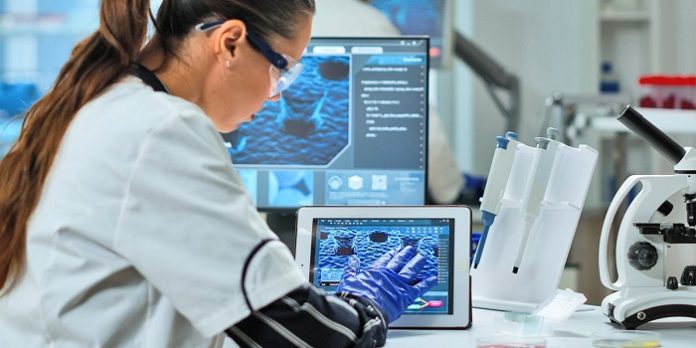Would you have imagined that one day, robots would be able to perform complex surgeries? Or that patients could consult their doctors without even being physically present there?
From doctors using stethoscopes to measure a patient’s heart rate to patients doing it themselves with the help of healthcare wearables and other similar devices, the healthcare software development sector has witnessed a massive technological shift.
The years following the COVID-19 crisis have impacted the healthcare industry, but on the other hand, technology has accelerated the implementation of healthcare trends that were in process.
Technology today allows doctors to conduct patient diagnoses from distant locations using audio-visual tools. Surgeons are using robotic arms to perform surgery on patients across the room. Hospitals are delivering food and medicine with the help of robots.
Healthcare software solutions have assumed significant importance in propelling healthcare toward technological advancements. Whether it is conducting AI-based diagnoses or using robots to perform complex surgeries, healthcare solutions that utilize the latest technology and innovations are transforming the industry.
How Technology Interacts With Healthcare Software Solutions
Implementing technologies such as real-time Data Analysis, AI-based chatbots, Robotics, and automation in the healthcare industry has paved the way for the healthcare sector to accelerate its market growth.
The adoption of these technologies has further created a need in the healthcare sector to hire a custom healthcare software development company that can offer secure, and scalable software solutions that can adapt to their changing needs and hence, save the cost and time of development while maintaining their market position.
Top Trends in Healthcare Software Development
1. Robotics
With advancements in Robotics technology, the healthcare industry is able to employ robots to conduct a variety of tasks, such as diagnosis, rehabilitation, and surgery.
The major reason behind employing robots to conduct surgery is that robots offer a lot of potential – they can conduct delicate tasks with extreme precision and they do not get tired easily.
Robots can also be used to provide care in remote areas, especially for patients that are unable to leave their homes. Robotics also empowers doctors and nurses to be able to travel inside hospitals to offer patient care, deliver medicine, or access important pieces of information such as X-rays, whenever required.
Healthcare providers can stay connected with patients in rural areas without access to care.
2. Artificial Intelligence
When it comes to treating patients remotely, Artificial Intelligence and Machine Learning solutions play a major role. The healthcare software development industry is employing Artificial Intelligence solutions to develop new drugs and improve the accuracy of patient diagnosis, among many other things.
Artificial Intelligence is altering patient-doctor interaction. Moreover, where healthcare diagnosis is considered, medical professionals can gain insights into care processes, treatment methodology, and patient outcomes.
Oncologists successfully leverage AI for the detection and analysis of Cancer at its early stages. AI is also being used by companies in mobile applications that are able to evaluate the risks of Cancer. This enables healthcare professionals to detect illness at the earliest stage and offer a quick, precise diagnosis.
3. Big Data and Analytics
Hospitals and healthcare institutions handle a large amount of patient information on a daily basis. This data needs to be processed to identify trends and anomalies and develop patient treatment plans.
Big Data and Analytics simplifies all of this. Data Analytics process this large amount of information that is stored by healthcare institutions to conduct preventive diagnostics and treatment by obtaining data-driven insights through numerical evidence.
Big Data can also be useful to researchers by letting them combine real-time, historical, and predictive metrics to detect and determine strong and weak points among patients and roll out medications and vaccinations accordingly.
4. Internet of Medical Things
There is a rise in self-care among patients. A larger number of patients prefer to conduct self-diagnosis for disease or to detect anomalies and risks through health wearables.
These are devices powered by the Internet of Things such as fitness trackers and smartwatches that are able to record and monitor the daily behavior of patients to detect tendencies among patients to develop illnesses or diseases.
This reduces the frequent visits by patients to hospitals and allows them to avail healthcare only when it is absolutely necessary.
5. Cloud-Based Solutions
The healthcare industry stores a large amount of sensitive patient data that regularly keeps getting updated. At the same time, a lot of stakeholders are involved when it comes to sharing that data, such as healthcare providers, patients, nurses, insurance companies, etc.
This makes it extremely necessary to ensure that the data is secure. Some of the major pain points of healthcare institutions are centered around data management such as data migration, legacy systems, and outdated cloud management and infrastructure.
By implementing cloud-based solutions for data transfer, sharing, and management, healthcare institutions optimize their resources, leverage tech stacks, and reduce the costs incurred by them.
6. AR/VR-Based Solutions
Healthcare professionals need to obtain feedback on treating a patient’s condition. Surgeons face a challenge when conducting complex surgeries.
Augmented and Virtuality-based healthcare solutions such as Google Glass, surgeons and doctors are able to display X-rays, MRIs, and ultrasound images in real-time to the patient’s body.
Surgeons can leverage these technologies such as brain mapping to conduct complex surgeries. VR headsets can be used to remotely teach surgical procedures to medical students without being present in the operating room.
Another advantage that this technology offers is that surgeons can view the detailed anatomy of the patient from a remote location or even conduct complete surgical procedures remotely.
AR/VR can also provide patients with an immersive experience; doctors can use this technology to show patients what their illness looks like and how different treatments will affect them differently.
7. 3D Bioprinting
3D Bioprinting technology in healthcare has the potential to create three-dimensional, natural tissue-like structures.
Using Artificial Intelligence and Machine Learning algorithms, 3D printing technology is extremely useful when offering prosthetics treatment to patients as it reduces the cost of implants and prosthetic treatment.
3D printing enhances bionic prosthesis for knees and hips in patients with cardiovascular or neurological issues.
8. Nanomedicine
Based on the application of Nanotechnology in medicine, Nanomedicine in healthcare is used for medical imaging, detection of diseases, diagnosis, and delivery of patient care.
Medical researchers are seeking ways and methods that are able to target individual cells with nanomedicine in order to discover solutions that can target drug delivery to tumors.
Also read: How Loan Servicing Software is Helping Lenders in 2023
Nanotechnology can also be used to fight viruses and bacteria in the patient’s body.
Benefits of Technological Innovation in Healthcare Software Solutions
- Enhanced Efficiency: HealthTech solutions can help streamline processes, automate routine tasks, reduce costs, and improve care delivery.
Improved Patient Care Delivery: Technological innovations in the healthcare industry can improve the way patient care is delivered by enabling better diagnosis, monitoring, and treatment. Innovations such as Clinical decision support systems help physicians offer precise and informed decisions relating to patient care through evidence-based treatment recommendations.
Remote monitoring using wearable health devices helps in tracking patient health to detect health risks at an early stage.
- Access to Remote Areas: Technological innovation in healthcare bridges the geographical gap between remote areas and healthcare delivery, letting patients access healthcare without having to travel to a specific clinic or hospital.
Through mobile health applications, patients can avail health information, preventive care, and diagnostics. This is helpful for patients who do not have easy access to healthcare facilities.
- Easy Data Integration: Hospitals generate a large amount of data from a variety of sources such as hospitals, clinics, labs, pharmacies, and health wearables. Software solutions that can integrate and analyze this data easily.
Integration and interoperability of data facilitate easy exchange of information between systems so that the patient data is visible to all involved stakeholders such as various doctors, insurance companies, etc.
- Enhanced Security: With an increase in the digitization of healthcare, security and privacy have become a rising concern in the healthcare industry. Technological innovation helps healthcare institutions put robust Cybersecurity measures in place that are capable of protecting sensitive patient data and enabling safe and secure data sharing.
- Reduce Costs: Innovations in healthcare software development can help healthcare institutions in reducing the costs that are associated with conducting administrative tasks, outdated processes, and patient re-admissions.
Employing automation in their routine processes helps hospitals and healthcare institutions optimize their resource allocation, which results in cost reduction for healthcare institutions. This, in turn, increases the affordability of healthcare services.
Hire the Best Healthcare Software Development Company
Healthcare software development is quickly gaining momentum with the advent of technology – it is changing the way healthcare is being delivered.
To keep up with the pace of technology and healthcare innovations, you need to collaborate with custom healthcare software development professionals who are adept at developing solutions that align with your business goals.
TRooTech is a custom healthcare software development company with a team of carefully vetted software engineers with expertise in HealthTech software development. From optimizing administrative processes to enhancing efficiency our experts deliver world-class healthcare software solutions that propel your business’s healthcare revolution.







